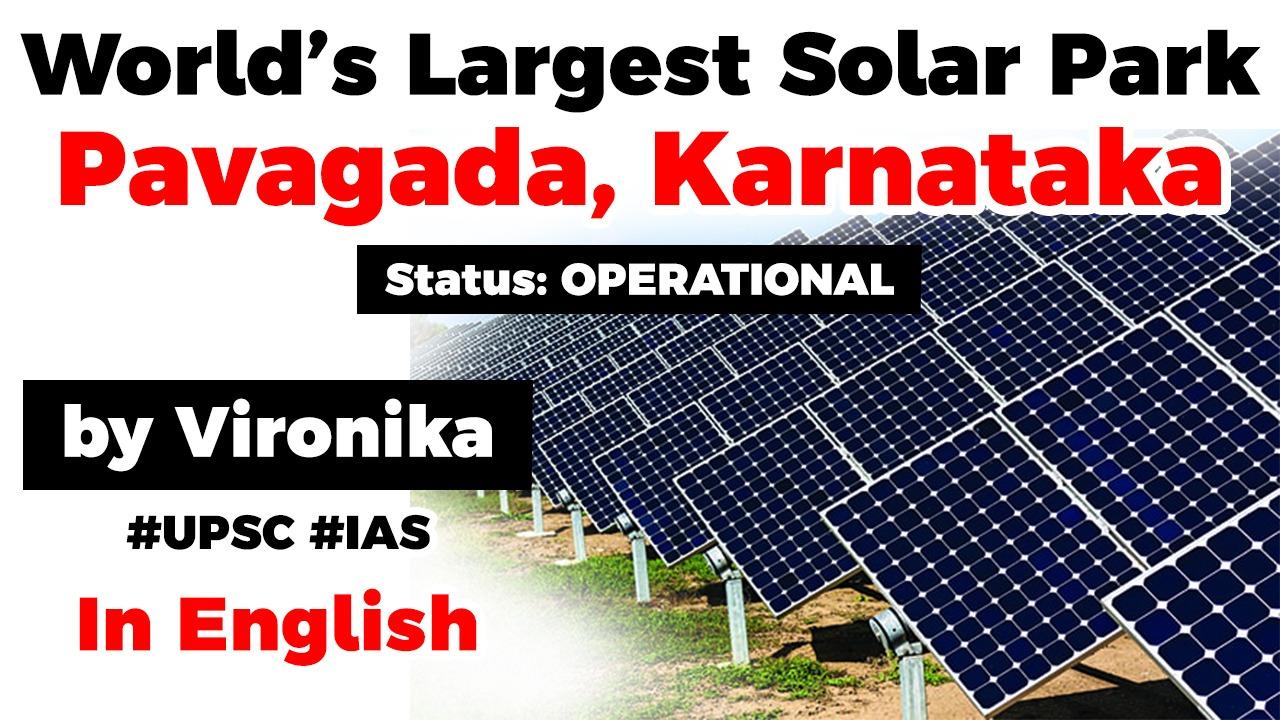Table of Contents

- The 2050 MW solar park located at Pavagada in Tumakuru district of Karnataka has now become completely operational.
- Recognised as the world’s largest solar park, ‘Shakti Sthala’ has been developed by the Karnataka Solar Park Development Corporation Limited (KSPDCL), a joint venture between the Solar Energy Corporation of India (SECI) and the Karnataka Renewable Energy (KREDL).

- The Pavagada solar park spans across 13,000 acres spread over 5 villages.
- The project that was conceptualized in 2015, and started developing in 2016, has been executed in a short span of two years.
- The project, officially launched in 2018, became completely operational in December 2019, after the final 200 MW capacity developed by SB Energy (SoftBank) was commissioned.
- Another unique feature of the project is that it has been successfully accomplished without any land acquisition.

- Pavagada solar park has been established on leased land of farmers which has helped in reducing the cost of its execution. The KSPDCL is paying over 2,300 farmers ₹21,000/acre/year with a five per cent escalation every two years for land that is being utilized for solar park development.
- Solar is one of the least waste generating methods of creating energy. It is therefore considered to be very beneficial. India is blessed with a lot of sunlight all throughout the year.

Solar Energy
- The radiation that is received from the sun and utilized in the form electricity and thermal energy by using various available technologie like photovoltaic panels, solar heater etc.
- India lying in tropical belt has an advantage of receiving peak solar radiation for 300 days, amounting 2300-3,000 hours of sunshine equivalent to above 5,000 trillion kWh.
- India facing problems in fulfilling its energy demand, solar energy can play an important role in providing energy security.
- Energy security
- Economic development
- Social development
- Environment concern
- Solar Energy is available throughout the day which is the peak load demand time.
- Solar energy conversion equipments have longer life and need lesser maintenance and hence provide higher energy infrastructure security.
- Low running costs & grid tie-up capital returns (Net Metering).
- Unlike conventional thermal power generation from coal, they do not cause pollution and generate clean power.
- Abundance of free solar energy in almost all parts of country.
- No overhead wires- no transmission loss
- For a developing country like India, where electricity for every home was once considered a dream is now close to reality. The government initiative of ‘power for all’ is changing the socio-economic structure of the country.
- The sector also has immense potential to create new jobs; 1 GW of Solar manufacturing facility generates approximately 4000 direct and indirect jobs.
- Strong financial measures are required to finance the solar projects, innovative steps like green bonds, institutional loans and clean energy fund can play a crucial role.
- Promotion of research and development in renewable energy sector, especially in storage technology.
- Proper mechanism should be provided to tackle China’s dumping of solar equipments.
Latest Burning Issues | Free PDF






















 WhatsApp
WhatsApp